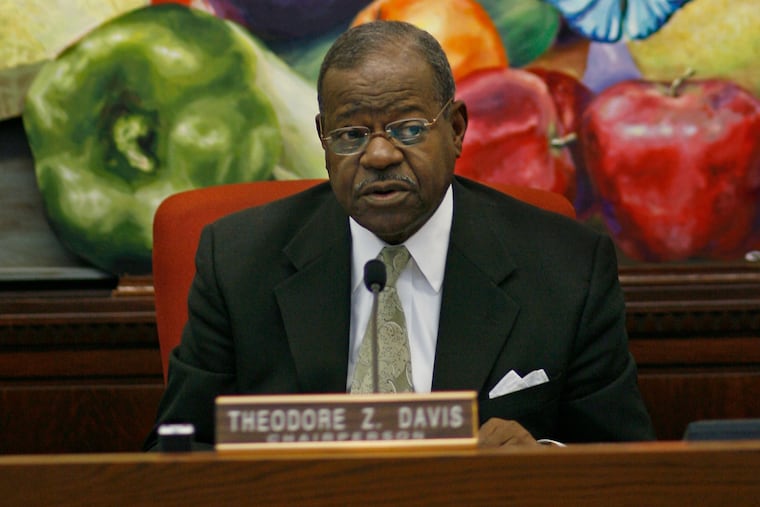Retired N.J. Superior Court Judge Theodore Z. Davis, who led Camden after state takeover, dies at 86
Mr. Davis, who died Sunday of complications from a stroke, is remembered as "judge's judge" who was dedicated to Camden and who served as a fiscal overseer during a state takeover.

Retired New Jersey Superior Court Judge Theodore Z. Davis, 86, who took on the task of trying to turn Camden around after a state takeover, died Sunday, April 12, at Cooper University Hospital of complications from a stroke.
Born and raised in Camden, Judge Davis spent his life and career in the city. He was an accountant, an assistant city attorney, a municipal judge, and an assistant Camden County prosecutor, and was among the first black people appointed to Superior Court in Camden.
“He loved Camden, never wanted to leave it,” said Superior Court Judge Morris G. Smith, who was his law clerk in 1985. “He wanted to make his mark here.”
In an unprecedented move in 2002, Gov. James E. McGreevey signed the Municipal Rehabilitation and Economic Recovery Act for Camden, including $175 million for economic growth and creation of a chief operating officer to supervise local government and education. It was the largest municipal takeover in U.S. history.
In 2007, Gov. Jon S. Corzine extended the takeover for five years, and appointed Judge Davis as the city’s chief operating officer, succeeding former Mayor Melvin R. “Randy” Primas Jr., the first COO under the takeover.
Judge Davis inherited a city government in disarray, with shoddy record-keeping, manual payroll records, and exorbitant overtime costs with little accountability. Known as a keen jurist and administrator, he ruffled feathers when he immediately issued an executive order: no hires, raises, promotions, overtime, or spending without his approval.
“I’m going to have to do something because no one else is,” he told City Council.
Current Mayor Francisco Moran remembered Judge Davis as a leader with “a no-nonsense attitude” who led Camden during one of the toughest periods in its history.
» READ MORE: State takeover of Camden ends
Judge Davis’ son, Theodore Jr., said his father accepted the job believing he could use his financial and legal expertise to make improvements.
“It was stressful,” recalled the son, a special education teacher in Camden. “He wanted to help the city, especially since he knew what it once was.”
Judge Davis stepped down abruptly from the $220,000-a-year post in 2009. Camden was returned to local control in 2010 and the overseer position was eliminated. The school system, troubled by years of poor performance, remains under state control.
» READ MORE: New leader puts Camden on notice
Growing up in South Camden, the judge had a tough childhood, according to his son. He was raised in foster care and overcame suggestions “that he wasn’t going to be a professional,” he said.
After graduating from Camden High School in 1951, Judge Davis enlisted in the Army and served in Alaska during the Korean War. He later earned a bachelor’s degree in accounting from Temple University and a Juris Doctor from its law school.
He was a fly fisherman, a photographer, and a furniture maker. He played classical music on the bass. His son said Judge Davis had no middle name, so he adopted the middle initial Z.
Judge Davis began his legal career in 1964 with the firm of Bennett, Wingate & Pascoe, specializing in corporate tax law. He was also a sports agent who represented NFL Hall of Famers Dave Robinson and Herb Adderley, according to his son.
In 1981, Gov. Brendan Byrne appointed Judge Davis to Superior Court. He later was named presiding judge of the Chancery Division-General Equity. He left the bench in 2003 when he reached the mandatory retirement age of 70.
In a statement Tuesday, New Jersey Chief Justice Stuart J. Rabner said Judge Davis “had a profound impact on the New Jersey judiciary” and praised his advocacy on behalf of minorities.
“His legacy will endure for generations,” Rabner said.
In 1992, Judge Davis chaired a state Supreme Court task force that produced a 1,200-page report that found discrimination against minorities in the state’s civil and criminal courts, whether they were defendants, lawyers, court employees, or judges.
And in a decision overturned on appeal, he found four Inquirer reporters in contempt of court for interviewing the jury forewoman in Rabbi Fred J. Neulander’s 2001 murder trial.
Smith described Judge Davis as “a judge’s judge,” who was fair to both sides and was always well-prepared when he took the bench.
“He loved being a judge. He loved the law,” Smith said.
His wife of 53 years, Joan, died in 2013.
A memorial service will be held later.